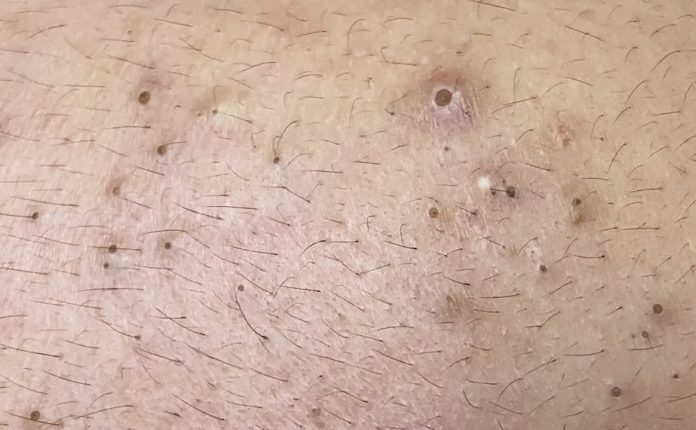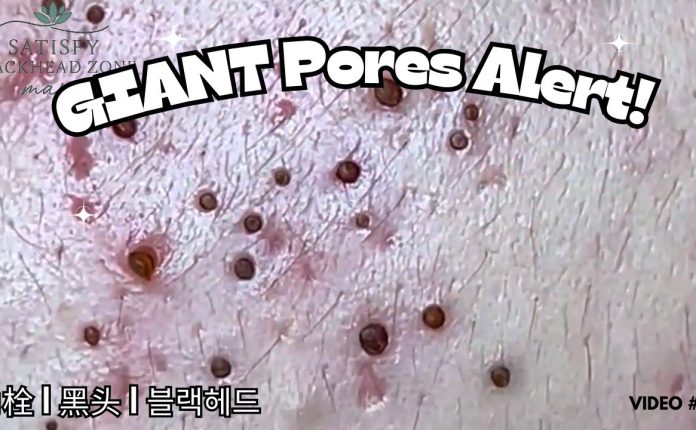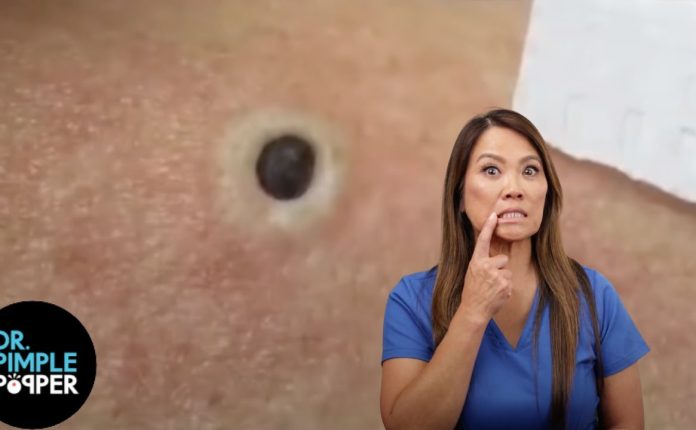
What looks like a single, gigantic blackhead on the outside actually hides a super dry and aged CYST that looks like a… bulb of garlic or mashed potatoes?! Share your thoughts in the comments below. 😮 (Video Below)
Big blackheads, also known as dilated pores of Winer, are caused by clogged hair follicles filled with excess oil, dead skin cells, and debris, which then oxidize and turn black when exposed to air. Hormonal fluctuations, excess sebum production, and improper skincare can all contribute to their formation.
Here’s a more detailed breakdown:
1. Clogged Follicles: Blackheads form when hair follicles, which contain a hair and a sebaceous gland that produces sebum (oil), become clogged with a buildup of sebum and dead skin cells.
2. Excess Sebum Production: Overactive sebaceous glands produce too much sebum, leading to a greater likelihood of clogged pores, especially when combined with dead skin cells.
3. Hormonal Influences: Hormonal changes, particularly during puberty, menstruation, pregnancy, or when taking certain medications, can increase sebum production, contributing to blackhead formation.
4. Skin Irritation and Bacteria: Irritation to the skin or surrounding follicles, as well as bacterial growth in clogged pores, can worsen blackhead formation and make them appear larger.
5. Genetics: Some individuals may be genetically predisposed to having more blackheads due to the way their hair follicles and oil glands are structured, according to Pure Dermatology.
6. Other Factors: Other contributing factors include:
- Heavy cosmetics: Oil-based or excessive makeup can clog pores.
- Tight or heavy clothing: Can cause friction and clog pores.
- Sun damage: Can worsen the appearance of blackheads.
- Medications: Some medications can cause blackheads as a side effect.
- Stress: Stress can increase cortisol levels, which can lead to increased sebum production.
Blackheads can be effectively removed and prevented with a combination of at-home treatments and professional procedures. Over-the-counter products containing salicylic acid or alpha/beta hydroxy acids can help unclog pores and promote skin turnover. For stubborn cases, professional treatments like chemical peels or microdermabrasion can be considered.
At-Home Treatments:
-
Salicylic Acid:Look for cleansers, lotions, or gels containing salicylic acid, which helps dissolve dead skin cells and unclog pores.
-
Alpha/Beta Hydroxy Acids (AHAs/BHAs):These can also help exfoliate and remove dead skin cells, with options like glycolic acid and lactic acid.
-
Topical retinoids, available over-the-counter or by prescription, can help break up blackheads and prevent pore clogging.
-
Exfoliation:Regularly exfoliating, either with a chemical exfoliant (like those mentioned above) or a gentle scrub, helps remove dead skin cells and debris that can contribute to blackheads.
-
Gentle Cleansing:Washing your face with a gentle cleanser can help remove excess oil and dirt that can lead to blackheads.
-
Don’t Pick!Avoid picking or squeezing blackheads, as this can cause inflammation, scarring, and potentially push the contents deeper into the skin, according to a video on YouTube.
Professional Treatments:
-
A dermatologist or esthetician can safely extract blackheads using specialized tools.
-
Chemical Peels:These involve applying a chemical solution to remove the outer layer of skin, promoting new skin growth and unclogging pores.
-
Microdermabrasion:This procedure uses a specialized tool to gently exfoliate the skin and remove dead skin cells, according to the Cleveland Clinic.
-
These treatments can reduce oil production and kill bacteria that contribute to blackheads.
Important Considerations:
-
Be Gentle:Avoid harsh scrubs or picking at your skin, as this can cause irritation and inflammation, according to La Roche-Posay.
-
Moisturize:After cleansing and treatment, use a gentle, non-comedogenic moisturizer to keep your skin hydrated.
-
Non-Comedogenic Products:Choose skincare and makeup products that are labeled as non-comedogenic, meaning they won’t clog your pores.
-
Consult a Professional:If you have persistent blackheads or experience any irritation or pain, consult a dermatologist for personalized advice and treatment.


